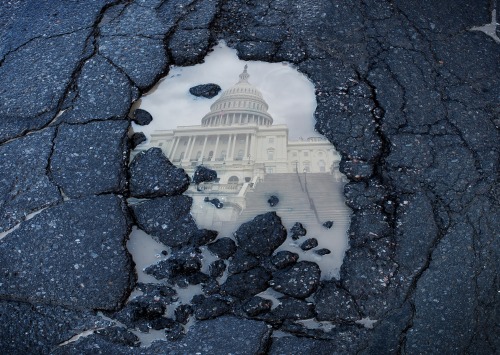
Transportation groups across the country applauded President Joe Biden for signing the Infrastructure Investment and Jobs Act on Monday.
The $1.2 trillion bill will provide funding for a historic investment into roads, bridges, rail, airports, energy systems, water and wastewater, public transit, and broadband internet, the White House said.
“Look folks, for too long, we’ve talked about having the best economy in the world,” Biden said during the signing ceremony. “We’ve talked about asserting American leadership around the world with the best and the safest roads, railroads, ports, airports. Here in Washington, we’ve heard countless speeches and promises and white papers from experts. But today, we’re finally getting this done.”
Biden said the new legislation would help American regain its place amongst the world’s leaders.
“Our infrastructure used to be rated the best in the world. Now, according to the World Economic Forum, we rank 13th in the world. Well, that’s about to change,” Biden said. “For example, because of this law, next year will be the first year in 20 years American infrastructure investment will grow faster than China’s. We’ll once again have the best roads, bridges, ports, and airports over the next decade. And we’ll lead the world into the 21st century with modern cars and trucks and transit systems.”
The bill includes an additional $559 billion in federal government spending, over and above the average annual investment of $650 billion, to address infrastructure priorities, including an additional $273.2 billion for the federal aid highway programs, $11 billion for road safety, $7.3 billion for the new Promoting Resilient Operations for Transformative, Efficient, and Cost-saving Transportation (PROTECT) program to increase infrastructure resiliency, $55 billion for water and wastewater infrastructure, $1 billion in grants to help states, tribal and multistate governments address cybersecurity threats, and $3.5 billion for the National Flood Insurance Fund, among other initiatives.
Representatives of the nation’s largest public workers professional organization, the American Public Works Association (APWA), attended the signing.
“The American Public Works Association worked hard to get IIJA across the finish line, and our invitation to view this important bill signing points to the dedication, commitment, and bipartisan efforts of the 30,000 members who plan, design, build, maintain, operate, and oversee the country’s vast infrastructure networks,” said APWA CEO Scott D. Grayson, CAE. “From roads and bridges to better protecting communities against natural disasters to modernizing our water infrastructure network, this new law will deliver significant upgrades in every state and benefit every person.”
The Association of American Railroads also supported the bill’s signing, noting the bill’s inclusion of $845 million per year for highway-rail grade crossing safety and elimination projects and an average of $5.55 billion per year for rail grant programs.
“Today, the nation took a long overdue step toward a more competitive, prosperous economic future with President Biden’s signing of the comprehensive infrastructure package,” AAR President and CEO Ian Jefferies said in a statement. “Prioritizing investments and commonsense policy solutions were the results of thoughtful, bipartisan negotiations and the tireless work of many. As we collectively face today’s challenges and build tomorrow’s opportunities, this package will help pave the way for a more modern, safer, and resilient infrastructure network.”
ARTBA Chairman Ward Nye, chairman and CEO of Martin Marietta, who also attended the event, called the bill’s signing a victory for the American people.
“It was my great honor to represent the ARTBA membership and U.S. transportation construction industry at today’s historic White House signing ceremony,” Nye said. “The bipartisan infrastructure law is a victory for all Americans. Let’s get to work delivering transportation project outcomes that will boost the economy and make our roadways and railways safer.”